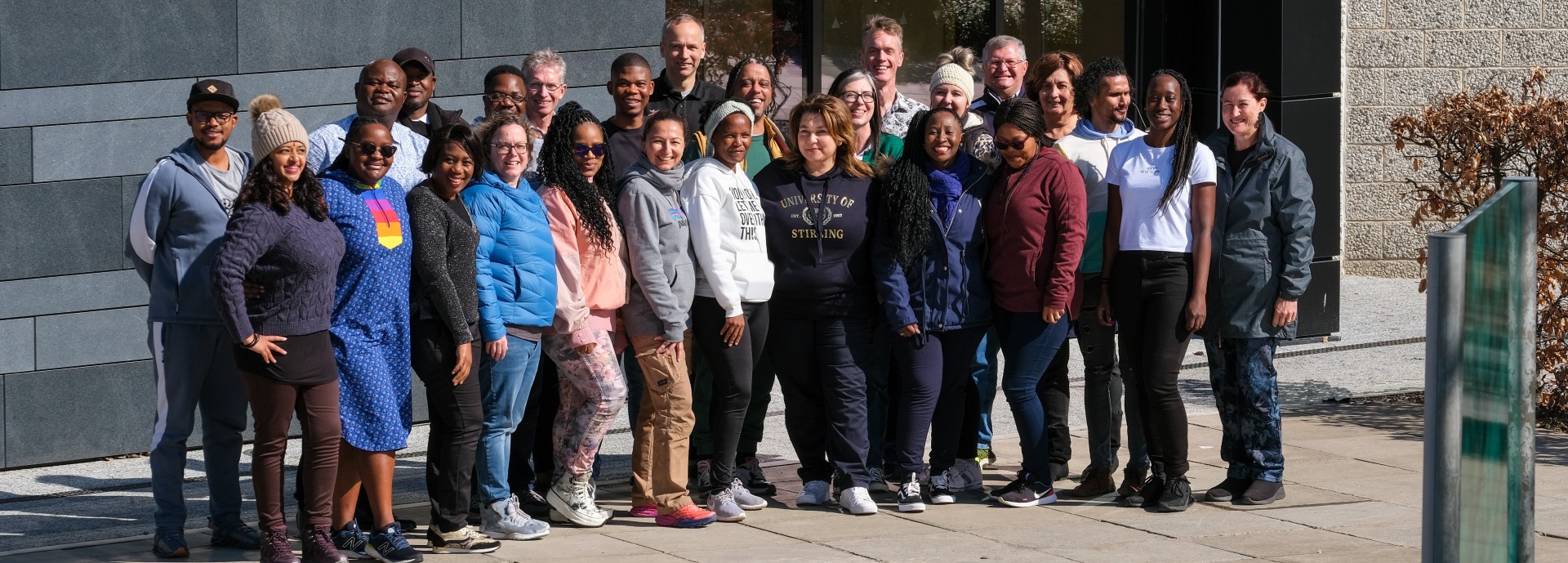The University of Stirling has partnered with four South African universities to enhance academic development and research at the country’s historically disadvantaged universities, including Nelson Mandela’s alma mater.
Through the project, academics from Stirling, the University of Cape Town (UCT), the University of Fort Hare (UFH), Walter Sisulu University (WSU), and Sefako Makgatho Health Sciences University (SMU), are delivering ten health sciences PhD scholarships for academics.
South Africa is home to several universities which have been historically disadvantaged, a consequence of apartheid, which only came to an end in 1994. As such, just a fraction of their staff has obtained a PhD – globally recognised as the highest level of degree and a requirement for faculty tenure. For example, at UFH – Mandela’s former university – just 42% have a PhD, 13% at WSU and 15% at SMU. This compares to 68% at the University of Cape Town, which is supporting the project.
Bolster research and skills
Funded by South Africa’s Department of Higher Education and Training (DHET), and University Capacity Development Programme, in collaboration with the British Council, the project will bolster the research and supervisory skills of the participating academics and, in turn, enhance the quality of teaching and research at their universities, while further strengthening the universities international strategic partnerships and academic collaborations.
Dr Naomi Brooks, Honorary Senior Lecturer at the Faculty of Health Sciences and Sport at the University of Stirling, said: “Less than half of permanent instructional and research staff at South African universities hold doctoral degrees. Men are more likely to hold a doctorate that women, and black academics are under-represented.
“Our project is addressing the low number and unequal distribution of academics with PhDs at universities in South Africa. Working with partners, we are building capacity and hope to establish a self-sustaining programme of development that enables academics with PhDs to train the next generation of researchers and develop academic and community relationships throughout the country.”
Dean of Health Sciences at the University of Fort Hare, Prof Mzi Nduna, said: “The University of Fort Hare revised the minimum requirements for appointment into a lecturer position and approved that a PhD will be the minimum requirement. This means that the University has a responsibility to upskill its current staff and is committed to this. This training project will go a long way in enhancing staff’s research skills and contribute to the achievement of the Faculty’s research goals”
The project aligns with the overall strategic development plans of the UFH, WSU and SMU to have at least 70% of academic staff members registered for PhDs by 2023. Once qualified, the participants will be permitted to supervise others working towards a doctorate. They will contribute to improving the supervisory experience, increasing recruitment of PhD candidates, and increasing new knowledge production.
Next generation
By bolstering the number of highly qualified academics, the project will increase capacity to train the next generation of healthcare workers and expand the research base to improve understanding of the underlying societal and physiological factors that influence health and disease in South Africa. In turn, it will support South Africa’s National Development Plan, which aims to eliminate poverty and reduce inequality by 2030 through inclusive economy; building capabilities and capacity of the state; and promoting leadership and partnerships through society.
Dr Brooks added: “In the long term, we envisage that the project will create a broader UK-South Africa network of institutions for knowledge exchange and bi-directional learning as well as research, and we look to further expand the doctoral training programme through future investment.”

